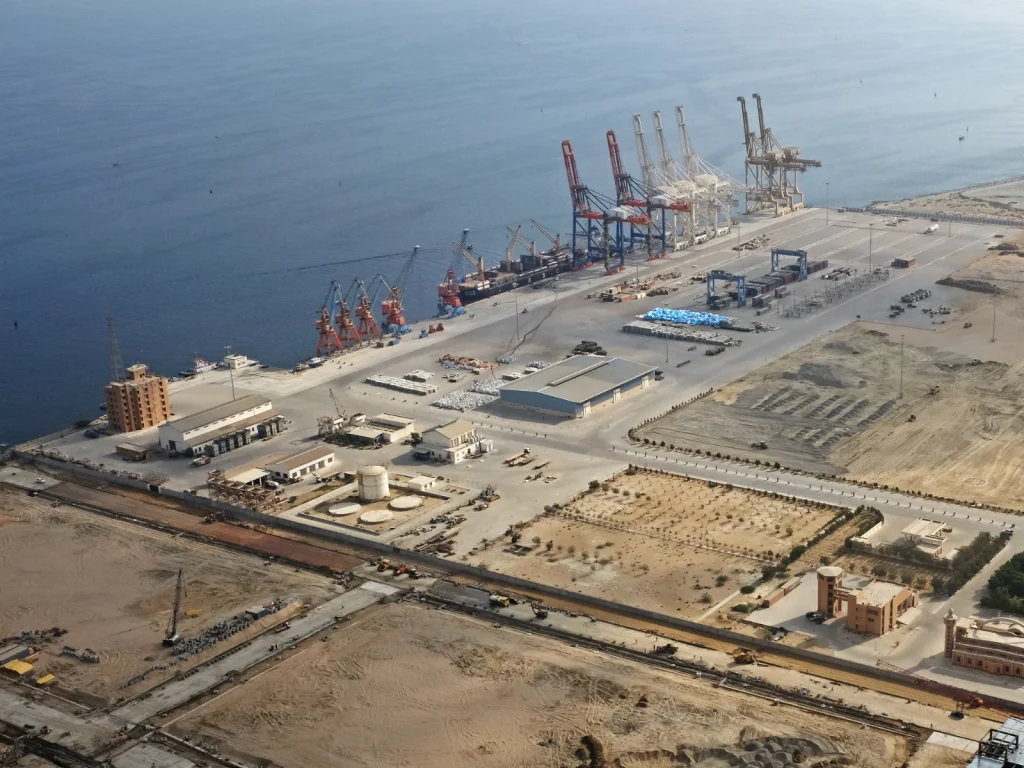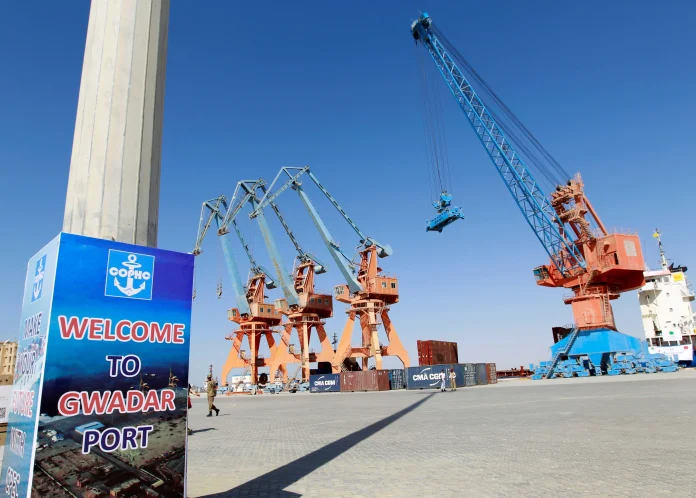BY Dr. Sahibzada Muhammad Usman
Since the official establishment of diplomatic ties between Pakistan and China have continually solidified and advanced. Throughout various periods of history and despite developments, Pakistani and Chinese governments and people have made continuous efforts to strengthen their friendship and establish a framework for friendly bilateral cooperation between beliefs, social systems, and cultures.
And they have realized the significance of evolving the China-Pakistan Economic Corridor, beginning in Kashgar, and reaching Gwadar and Karachi, via the Khunjerab Pass and various other branch areas, for consolidating Pakistan-China economic relations, boosting friendly cooperation, and forming the common destiny of the two nations. The CPEC is a developmental and economic initiative for the region’s people. During President Xi Jinping’s visit to Pakistan in 2015 and established the “1+4” style of cooperation, prioritizing Industrial Cooperation, Infrastructure, Energy, and Gwadar in addition to CPEC. This has inaugurated another episode in the building of CPEC.
China and Pakistan have agreed to jointly start new Corridors in November 2022, in addition to the current multibillion-dollar CPEC, as the two all-weather allies aim to enhance bilateral ties in multiple sectors, including technology, science, health, and agriculture. Moinul ul Haq (Pakistan’s Ambassador to China) spoke at the China Economic Net (CEN) on the new Corridors: China-Pakistan Green Corridor, China-Pakistan Health Corridor, and China-Pakistan Digital Corridor. The first will concentrate on green development, food security, and the agricultural environment, the second will assist Pakistan in gaining competence in the medical profession, and the third will strengthen Pakistan’s IT sector.
Global warming is one of the greatest threats to our way of life. Energy projects in BRI (Belt and Road Initiative) nations must limit climate consequences and, more generally, any negative environmental repercussions while offering economic development opportunities. To date, BRI nations are among the major beneficiaries of fossil fuels and coal investments, especially from China. Pakistan is the most significant recipient of Chinese investments under the BRI. Pakistan has secured around US$36 billion in energy projects and US$10.6 billion in transportation investments under the auspices of the CPEC. Coal received 28% of the investment projects, while gas received just 7%. With Pakistan’s objective to not construct new fossil power plants and China’s statement that it would not construct new coal plants overseas, two difficulties arise: how to speed the green transition via green investments while eventually phasing out current brown expenditures. Encouraging an effective greening of CPEC will be crucial in greening various BRI nations to green their offshore Chinese participation in the BRI. The objective of establishing the CPGC by the developers, investors, and governments of both nations, in addition to civil society, would be to assist, expedite, and promote this transformation within the BRI and Pakistan. It seeks to decarbonize and green CPEC by assisting a re-direction of Chinese investment projects away from emission-intensive investments and towards green construction projects, such as renewable energy from coal, and preferably an early expiration of current coal plants. On the supply side, the CPGC will collaborate with Pakistani stakeholders to establish a better flow of green investment possibilities and offer suitable planning and evaluation expertise for green projects.

The CPHC will catalyze reform in Pakistan’s health system. Working jointly, both nations can expand this business worldwide. As per China Economic Net (CEN), Pakistan is home to the 7,000-year-old Mohnjo Dharro and Harappa civilizations. Traditional medical practices in Pakistan have a rich history and are developing stronger ties to ancient Chinese medicine, which has previously been extensively used to manage and treat pandemics and problems. Jinhua Qinggan Granules are safe and effective in treating COVID-19 patients across Pakistan. The government of Pakistan may give more enticing guidelines for the Chinese Ancient Medicine and pharmaceutical industries to collaborate with local businesses and institutions. Both nations may play a significant role in conventional medicine trades and might join the Program for Regional Healthcare Centers, which combines western and herbal treatment. Furthermore, collaborate in research and development, extraction, production and management, classification, application, teaching and training, and entrepreneurship. Pakistan may learn from China’s expertise in managing high-quality herbal medicinal resources. Pakistan is actively involved in global and exchange forums, and China and Pakistan may boost the popularity and impact of traditional medicine around the globe by working together.
The CPDC will improve collaboration in a variety of information technology-related industries. Pakistan has a wealth of expertise and human resources in several disciplines of technology and science. Regarding software development, Pakistan will be a valuable resource for China. Therefore, Pakistan and China are collaborating to establish training facilities in Pakistan for producing software in many IT disciplines. The need to concentrate on AI in cyber security and future technologies, where Pakistan must collaborate with China.
During the recent visit of Pakistani Prime Minister Shehbaz Sharif to China, both sides emphasized the importance of the Gwadar port as the flagship project of the CPEC and an important base station in cross-regional connectivity. Pakistan-China expressed satisfaction with the finalization of important initiatives and agreed to expedite the development of other activities related to the free zone and Gwadar port. In accordance with the leadership’s consensus to intensify collaboration in the fields of agriculture, information technology, mining, and social progress under CPEC, the two parties have agreed to build upon digital, industry, health, and green corridors that were officially launched this year and to engage in relevant collaboration. The Chinese side recognizes the Pakistani government’s efforts to energetically promote renewable energy projects, particularly solar projects, in line with the energy sector’s green and environment-friendly growth and invites Chinese firms to participate in this endeavor.
China and Pakistan have committed to vigorously encouraging the execution of the Joint Declaration on Industrial Cooperation to boost Pakistan’s industrial growth. Pakistan reiterated its pledge to ensure the security and safety of all Chinese individuals, institutions, and projects in Pakistan. The Chinese admired Pakistan’s firm determination and active actions in this area. It also observed the continuous growth in bilateral trade volume after the second stage of the Free Trade Agreement became operational. The Chinese side indicated a desire to actively assist the Pakistani side in boosting exports to China and welcomed the entry of high-quality Pakistani commodities, especially food and agricultural products, into the Chinese market.
In addition, it was decided to support investments and collaborations in Pakistan’s export-oriented industries, which would assist in attaining sustainable bilateral trade development and undertaking a partnership to further strengthen trade and economic cooperation between the two countries. It decided to maximize commerce and exchanges by modernizing infrastructure at the Khunjerab border port and bolstering cooperation on disease prevention and border checks in regions. In addition, the parties committed to collaborating to enhance the execution of the Quadrilateral Traffic in Transit Agreement (QTTA), a key pillar of regional connectivity. China-Pakistan hailed the implementation of an MOU on e-commerce and encouraged the development of Pakistan’s national pavilions on China’s e-commerce platforms in recognition of the immense scale of China’s e-commerce industry and its prospects to further strengthen bilateral trade. It will increase cooperation between startups and medium-sized businesses.
Both countries parties signed and indicated several MoUs/agreements covering collaboration in e-commerce, financial cooperation, export of agricultural products, digital economy, protection of cultural property, post-disaster reconstruction, infrastructure, GDI, flood relief, animal disease control, cultural cooperation, livelihood, space, security, geosciences, and law enforcement.
About Author:
Dr. Sahibzada Muhammad Usman
Research Scholar and Academic; Assistant Professor in the Department of Strategic Studies at Air University, Islamabad, Pakistan. Ph.D. in Political Science at the University of Pisa, Italy. Dr Usman has participated in various national and international conferences and published 30 research articles in international journals.






